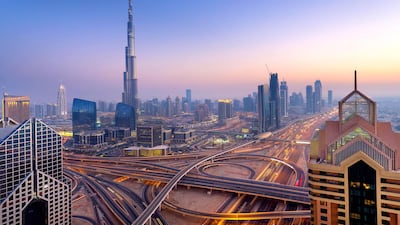This week, Sheikh Hamdan bin Mohammed said "promising progress" is being made towards accomplishing the objectives of an ambitious 50-year vision set out for Dubai by his father. The follow-up by the Crown Prince of Dubai is part of his role overseeing the charter that was unveiled by Sheikh Mohammed bin Rashid, Vice President and Ruler of Dubai, at the start of the year to mark his own half-century of public service.
The charter's aims include developing the equivalent of a modern Silk Road for commerce and trade, with Dubai as its hub, and a virtual city for businesses from anywhere in the world to be a part of, without physically being based in the emirate. A geo-economic map will also assign economic objectives to independently governed zones, which will draw investment. There will be quality health care services and 24-hour access to doctors, facilitated by an app. Philanthropic initiatives will also be embedded in everything Dubai does.
Also combined with the charter’s message are the eight principles of governance outlined by Sheikh Mohammed. They include a commitment to the wider union of the UAE; ensuring that no one is above the law; cultivating a neutral, business-friendly environment based on tolerance and respect; the promotion of talent; caring for future generations; and nurturing economic diversification and growth.
The hope of the charter is another 50 years in which Dubai stands out as a prosperous city where “future generations achieve their dreams and aspirations”.
This is all being carried out in “the spirit of compassion, love and harmony”.
In such a fractious time, that sounds pretty good. It is also a strong message for younger people who may be asking what kind of world they want to grow up in.
So much of politics and governance today, especially in western democracies, is caught in the trap of putting immediate concerns first. Not enough is being done to ensure that the problems of today do not become the grim legacies of tomorrow. This is not just about the environment, but also about education, jobs, well-being, quality of life and, ultimately, what government should look like in the decades to come.
The charter’s influence can be felt, just six months on from its launch. The power and water utility company Dewa has begun work on the installation of solar panels in 5,000 Emirati homes, part of a target to connect 10 per cent of Dubai homes to clean energy sources. Tackling the impact of climate change is perhaps the most critical challenge of the next 50 years for any city or nation.
Other government institutions, such as the Roads and Transport Authority and the Land Department are also incorporating the charter into their day-to-day efforts. Etisalat and Du are spending billions to upgrade the telecoms infrastructure to enable 5G and a high-tech future of automation and augmented reality.
Every year on January 4, Dubai will release the charter again, alongside the announcement of “exceptional” projects, further providing momentum to the initiative.
Beyond the UAE, many other countries acknowledge the importance of longer-term planning. The Centre for Public Impact says Finland, for example, has created a “foresight mindset” with the aim of thinking ahead to the next 50 years. Part of this is the recent experiment with the idea of universal basic income. Singapore, Brazil, Japan and India are also mindful of not being beholden to the “lens of now”.
Foresight is now an integral part of strategic planning across the UAE government landscape.
What it does, more than anything, is to put people at the heart of any policy priorities. Ensuring that future generations will have enough critical resources – financial, natural and otherwise – to live happily and healthily.
The obvious short-term outcome of this approach is that immediate policy-making will also be mindful of how they might impact those people living 50 years from now.
This will make sustainability an important part of anything we choose to do today. Not just environmentally related, but in the broadest sense of the word. How to lead with the idea that whatever we choose to do, it must be something that can continue to reap benefits decades from now, not just a for a few years.
That kind of thinking in the public sector can then migrate to the private sector, and into all areas of our lives. People used to say “act short-term and think long-term”. However, the 50-year Charter perhaps inspires us to act in the longer-term and let the short-term take care of itself. We might find that we won’t have to wait long to see this idea bear fruit.
Mustafa Alrawi is an assistant editor-in-chief at The National


